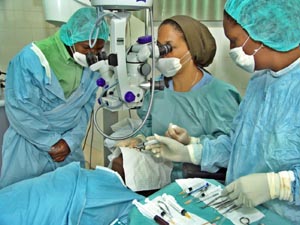Restorative vision operations in Cuba have changed their lives
CIUDAD VICTORIA, Tamaulipas.— José Juan Pineda knows what it’s like to have to bear all kinds of nicknames alluding to the strabismus he was born with; 26 years have not been enough to get used to all the verbal abuse heaped on him from strangers and acquaintances alike, children and adults, and even professionals.
“
Socially, it’s awful to have a problem like mine, a childhood of ridicule, teenage years that were terrible, and even now as a professional, people’s jokes were ever-present – even my fellow engineers at work would say, ‘you have one eye mixing concrete and the other laying bricks.’
The most recurring nickname was ‘norno’ because they would say that I had one eye in the north and another in the northeast. When I was a child, they always called me ‘cross-eyes.’ It’s painful and traumatic to live like that; people don’t understand how one is born with defects. Even though science is well advanced, (I didn’t have) enough money to use the advanced clinics. That is why, now that my eyes are in their place, I never tire of blessing the moment that the Cuban doctors changed my entire life.”
The engineer from Ciudad Victoria is one of 300 people from the state of Tamaulipas who have benefited from Operation Miracle, a program of the Cuban government and Latin American organizations like the Workers Party here in Tamaulipas.
“The truth is, when you’ve lived your whole life with an eye problem and all of a sudden, in a matter of months, it is fixed – something you didn’t even dream of – you don’t tire of thanking and blessing the hands of the Cuban doctors who made that miracle possible, transforming my life. In spite of all the efforts I made to live a normal life, the constant abuse had my self-esteem in the pits; that has changed now, and together with my wife and my two children, I am completely happy. This confirms that God exists, and manifests himself where you least expect it.
Like the engineer, Socorro Perales Roco, 67, testifies that “miracles do exist.”
“I’m diabetic,” she says, “and I was going blind, because for people like me it is impossible to pay a private doctor for an operation, and at the health institutions there is no way to obtain rapid and adequate attention. I had cataracts in my eyes for many years; only someone who had experienced it knows what that means. In my home, I am at God’s mercy, because even though
I have five children, they are living their own lives. I understand that, and I try to keep myself going as much as I can. I try to survive in any way I can; I make tamales and sell whatever I can. Unfortunately, in recent years, with my eye problem, my situation was awful. Now, I thank God for having the operation, and even though I haven’t completely recovered, everything is going well.”
Regarding her experience in traveling to Cuba, she says if anything surprised her, it was the humanity of the doctors, nurses and social workers there.
“Really, it makes me so happy just to remember the affection and care they showed us; for them, we were not just case numbers, we were human beings whose lives could change if everything came out well in the operation and the attention they gave us. And they sure did achieve that, because by giving me back my sight, they gave me back a useful life, which will allow me to get up every day and work to be able to survive.”
Juana Facundo Viuda de Flores, 65 is a similar case; she does not cease speaking wonders about Operation Miracle.
“I have had diabetes for 24 years, and so I was losing my sight, and with that, life itself, because blindness not only keeps us from enjoying the beauty of life, but also from being useful, and having to depend on others to go out into the street or do housework, which was my case.”
“Even though I have social security,” she adds, “not much could be done, because with my clinical condition, there wasn’t much possibility of recovery. At my age, that really weighs you down — watching the days go by, and with each passing day, you are more vulnerable. That is the situation I was in when they told me about the campaign Cuba was carrying out for people like us. Today, thank God, I can see, and with that, at my age of 65, my hopes for a dignified life have returned.”






